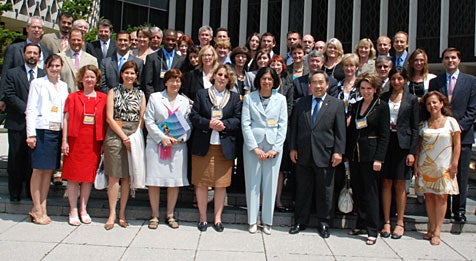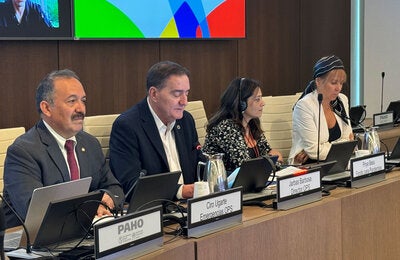
 Representatives of leading food manufacturers, pharmaceutical companies, and related private sector organizations gathered this week at the Pan American Health Organization (PAHO) in Washington to discuss a joint proposal by PAHO and the World Economic Forum to create a public-private-civil society partnership to fight chronic diseases and promote healthy living in Latin America and the Caribbean.
Representatives of leading food manufacturers, pharmaceutical companies, and related private sector organizations gathered this week at the Pan American Health Organization (PAHO) in Washington to discuss a joint proposal by PAHO and the World Economic Forum to create a public-private-civil society partnership to fight chronic diseases and promote healthy living in Latin America and the Caribbean.
Washington, D.C., 17 July 2009 (PAHO)—Representatives of leading food manufacturers, pharmaceutical companies, and related private sector organizations gathered this week at the Pan American Health Organization (PAHO) in Washington to discuss a joint proposal by PAHO and the World Economic Forum to create a public-private-civil society partnership to fight chronic diseases and promote healthy living in Latin America and the Caribbean.

(Photo David Spitz-PAHO/WHO)
The proposed Partners' Forum for Prevention and Control of Chronic Diseases in the Americas would bring together leaders from the private sector, international organizations, government, and civil society to raise awareness about chronic diseases, advocate for public policy changes, share successful practices, and mobilize resources and other support for actions aimed at reducing risk factors and improving treatment of chronic diseases.
Chronic diseases such as heart disease, cancer and diabetes are the leading causes of premature death and illness throughout the Americas. An estimated 1 in every six to ten adults in the Region has diabetes, and 1 in every three to five has high blood pressure. These diseases are strongly related to a handful of risk factors, particularly unhealthy diets, physical inactivity, tobacco use, and the harmful use of alcohol. An estimated 80 percent of heart disease, stroke, and diabetes and 40 percent of cancers could be prevented by modifying these risk factors.
Dr. Socorro Gross, Assistant Director of PAHO, in opening the meeting said the new Partners' Forum would mobilize support from people and institutions both within and outside the health sector to advocate for and catalyze changes in policy, marketing, medical care, and individual behavior that are needed to reduce these risk factors and improve treatment for chronic diseases.
James Hospedales, coordinator of chronic disease prevention and control in PAHO, said, "We believe that, with the help of a partnership of this kind, we could reduce deaths from chronic diseases by 2 percent yearly, saving not only millions of lives but also billions of dollars in economic losses and improving productivity. By bringing together partners from a wide cross-section of society and mobilizing leadership at the highest political levels, we believe we can achieve this ambitious goal."
A related PAHO effort, the Trans Fat Free Americas initiative, has been working in similar fashion since 2007 to eliminate trans fatty acids in industrially produced foods in Latin America and the Caribbean. The initiative has mobilized nutrition experts, government regulators, and representatives of the food industry to support these efforts. The major food companies in the region committed to eliminating TFAs from their products, and PAHO is in the process of evaluating progress in this area.
Hospedales said chronic diseases have not received the policy attention they merit due to a number of factors, including insufficient public awareness, outdated public health curricula, and the omission of chronic diseases from the Millennium Development Goals.
However, growing consumer concerns about the quality and costs of health care and the lack of access to care are creating a political and social environment that is conducive to efforts to prevent and control chronic diseases.
In addition, said Hospedales, efforts to prevent chronic diseases are consistent with growing demands to "put people first" in policies on transportation, climate change and the environment, trade, and agriculture.
"These kinds of policies and concerns are creating new opportunities to make the healthy choice also the easy choice by promoting healthier agro-industrial practices and healthy behaviors such as biking and walking, using public transportation, and eating locally grown food. The Partners' Forum can actively support and promote these kinds of efforts."
Nearly all agreed to support the Partners Forum. Five specific workstreams were agreed upon: advocacy, communication and education; healthy diets, particularly salt reduction; physical activity, especially "Ciclovias"; scaling up access to health services; and workplace wellness.
The Partners Forum is scheduled to be announced on September 29 and launched on December 3 by PAHO's Director.
Participants in this week's meeting included representatives of PAHO and the World Health Organization (WHO), the World Economic Forum, the Public Health Agency of Canada, the Inter-American Development Bank, the International Business Leaders Forum, Abbott Laboratories, Johnson & Johnson, Merck & Co. Inc., Pfizer, Sanofi-Aventis, GlaxoSmithKline, Dow Chemical Co., Medtronic, Kraft Foods, McDonald's Corp., General Mills, Unilever United States Inc., the Coca-Cola Company, PepsiCo, Grupo Bimbo, Mars Inc., CONMEXICO, Ernst & Young, KPMG, the Boston Consulting Group, Oxford Health Alliance, and Right Management.
LINKS:
- Partners' Forum for Chronic Disease Prevention and Control homepage
- PAHO's Chronic Disease Prevention and Control homepage
- The CARMEN Network (Collaborative Action for Risk Factor Prevention & EffectiveManagement of NCDs) homepage
For more information please contact Donna Eberwine-Villagrán, Public Information Officer, Knowledge Management and Communication, tel (202) 974-3122, fax (202) 974-3143.



